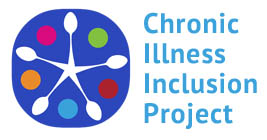What does Covid-19 mean for the chronic illness community?
A guest blog by Catherine Hale with Alison Allam, Victoria Clutton and Leonora Gunn.
The Covid-19 crisis has us all in shock. But it has also shone a light on our social exclusion as a group of disabled people, as well as our hopes for inclusion.
Like other disabled people, the predominant response of the chronic illness community to the pandemic is fear. Many of us have conditions or treatments that put us at greater risk from this virus. We are walking a tightrope between the need to self-isolate and our dependence on others, whether family or paid assistants for day to day life, who may transmit the disease. Uppermost on our minds is how to get hold of food and medicines, and what will happen to us if our caregivers get sick.
But beneath that there are some deeply conflicted emotions running through our online networks. We are collectively feeling a mixture of hope and hurt as we watch how the world responds to Covid-19. Here’s how Elis Elmo put it to a Facebook group:
As someone who has been at home in bed for just over 6 years, I’m having such a mix of emotions I don’t know how to deal with them to be honest. I mean it’s good – “Wow” – look how much stuff out there for people at home and how people are caring for mental health in those situations. But I’m also sad because it makes me realise how much I was (and still am) forgotten. It really was that easy for people to care, they just…didn’t.
With half the world in lockdown, young and healthy people are experiencing a kind of isolation they may never have known before. Many are taking to social media to broadcast their boredom, frustration and grief at cancelled plans. Anxiety and distress are a normal response to a global pandemic. They are also, it appears, a common response to isolation itself. The loss of face to face interaction, the stifling sense of confinement – this is not how we humans are hard-wired to exist.
As this excellent Twitter thread by Zara Bain explains, many of us have been housebound, or indeed bedbound, for years or decades. This is not necessarily because social care services have failed to support us to get out and about, but rather because of the intrinsic nature of what we have termed “energy impairment.” Our forthcoming report describes energy impairment as a debilitating mix of physical and cognitive impairment.
Research by the Chronic Illness Inclusion Project (CIIP) captured the experiences of people with energy limiting chronic illness. In our recent survey of over 2,300 people, social isolation and loneliness were rated as the biggest social problem they faced, over and above their health condition itself. Isolation was rated a bigger problem than poverty or discrimination. Almost half of respondents with energy limiting conditions reported a comorbid mental health problem.
Yet before Covid19, in the public imagination, our lives were one long Netflix binge under the duvet. Now that non-disabled people are suddenly faced with cabin fever what hits home for us is the complete lack of empathy for our predicament before it happened to them.
From Sarah Campbell on Facebook:
Pre Covid-19:
People to me: “You’re so lucky. I wish I could just stay at home/in bed all day”
Post Covid-19:
“OMG: I have to stay at home a WEEK? What am I going to do? I’m going crazy on day 2! Poor me! This is awful!”
We in the chronic illness community are veterans of #selfisolation #lockdown #quarantine or whatever hashtag you want to apply to the covid19 experience. We have honed the art of housebound existence and are keen to share our survival guides, and our nuggets of wisdom. Check our post Housebound by Victoria Clutton, or Inside, a guide by author Josie George.
In return we would like some validation of our experiences and some respect for our hard-won resilience to isolation. Perhaps more than anything, we would like the world to care.
Some of us who’ve been housebound for years are getting kind notes through the door from longstanding neighbours offering help, often people we’ve never even met in the flesh before. Suddenly there is the sense that belong to our communities, we are held in mind, we are all in it together, and we are there for each other. This spirit of solidarity can be a welcome balm from our usual state of exclusion and invisibility.
It also brings home how little people thought of us before.
We are gobsmacked by the explosion of online activity and connectivity springing up in response to isolation. Suddenly the world has woken up to the fact that studying, working and socialising from home via the Internet is possible. The technologies for remote access and participation are being harnessed in a wave of innovation and energy. Yet, pre- Covid19, when we asked for these things, they were too difficult; or we were being awkward. Perhaps it was too hard to believe that our symptoms and impairments really do confine us to this extent. And perhaps it was easier to think we were just anti-social, or too lazy to make the effort to go out.
The discussions we’ve had in the CIIP go like this:
Is anyone else finding all the virtual yoga classes, museum tours, artistic exhibitions, theatre, cinema, reading groups… (the list goes on and on), not to mention all the remote work, kind of bittersweet? It’s wonderful that they’re there now, but I have been told so many times that they weren’t possible. And the answer is, as I think many of us expected all along, that these things were possible. It’s just that we weren’t worth it.
How many birthday celebrations and just general *things* have I missed because accommodations couldn’t be made for me and remote attendance options weren’t allowed or weren’t thought of. I worry sometimes that I’m so used to the limits that I’ve had to learn to live with, that I don’t even see past them anymore.
The chronic illness community was born from the Internet. Digital and social media networks are what connect us to each other from our beds and sofas around the world. But the wider world has ignored us. So along with the wonder of new online possibilities, there is also the hurt of realise we could have been included, if only people had thought we were worth the trouble.
For now, then, the panic is uppermost, and the losses from Covid-19 to our families and our communities will be immeasurable. But, like others, we hope for a better world on the other side of Covid19. The legacy of this crisis must be that that society has a better understanding of the lives of those of us who will remain housebound after it’s over. We hope that the sense that we belong too, and that our lives matter, will linger. After everyone else has gone back to their workplaces and their bars, we hope they will still reach out and include us on skype, Zoom, because it’s really not that hard, or just ask if we need some shopping or fancy a chat.
Catherine Hale
http://www.catherinehale.net/
Twitter: @octoberpoppy
Leading the Chronic Illness Inclusion Project @chronicinclude







